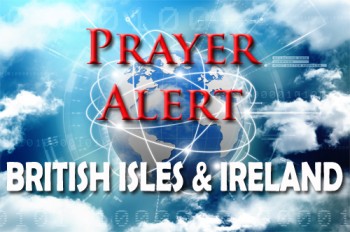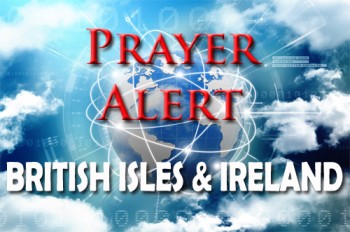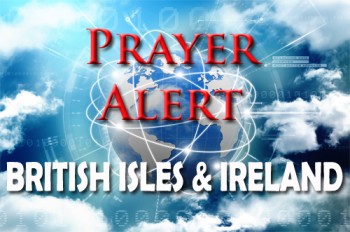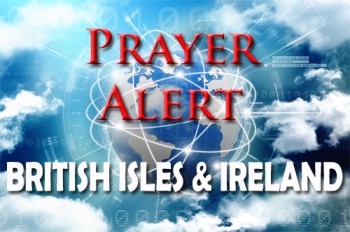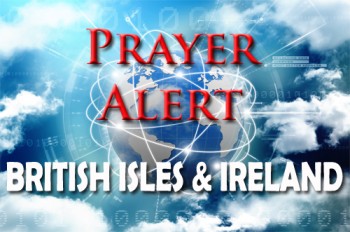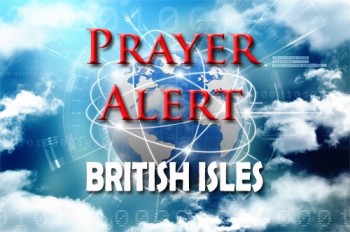
David Fletcher
David Fletcher is Prayer Alert’s Editor.
He is part of a voluntary team who research, proof-read and publish Prayer Alert each week.
If you would like to make a donation towards our running costs, please click here.
Britain has a shortage of veterinarians, medical practitioners, engineers, artists, web designers and architects according to the Government Migration Advisory Committee (MAC). Only workers from the European Economic Area (EEA), that's EU countries plus Norway, Iceland and Liechtenstein, enjoy freedom of movement to travel within the area without visas. The UK currently allows 20,700 high-skilled workers entry per year. If a job title is included in the list of vacancies it means there are lower visa application fees, no requirement to advertise the job to UK workers, or meet £35,800 salary threshold for settlement after five years. The MAC recommended there should be a ‘full review’ of the shortage occupation arrangements once it is clear what the future immigration system will look like after Brexit. We can pray for the skilled labour cap of 20,700 to be raised regardless of Brexit, and for appropriate applicants outside of the EEA to be given working visas to cover the manpower shortage in the ‘skilled workers’ categories.
There has been much improvement over the years in quality of life for children, but we have not yet eradicated the serious harm inflicted on children at risk. Risk is increased by poverty, alcohol- or drug-addiction, domestic abuse and where parents have learning disabilities or mental illness. Childhood neglect can be a gateway to deeper problems. UNICEF reported that approximately one in 10 of all girls under 20 have experienced sexual violence. Children not in school are at greater risk. Wars take place in streets these days. In conflict areas, or where natural disasters have struck, vaccination rates plummet, education stops, trauma multiplies. Worldwide 10-20% of children and adolescents experience mental disorders. The Church is uniquely well-placed to protect children at risk and make them more resilient, resourceful, and hopeful for a brighter future. No other organisation can supply such time, compassion, volunteers, skills, and spiritual resources.
Reverend John Parker has resigned over the way a Church of England school handled an eight-year-old pupil's plan to change gender. He supported the boy's wish to become a girl but was silenced when he raised concerns that parents and pupils would be kept in the dark. He feared staff and governors had been misled by a transgender lobby group which advise the school. After his concerns were dismissed by the bishop Reverend Parker quit the church which he had served for 14 years. His resignation letter spoke of his fear that children were being 'sacrificed on the altar of trans ideology', in Church schools. Mr Parker said, 'I was basically told by my bishop that if I wished to follow the teachings of the Bible faithfully then I was no longer welcome in the Church. It felt like I was being silenced by the Church and the school.'
Trafalgar Square will be transformed into a joyful family festival and service. The day is packed with festivities; live performances from acts including worship leader and Grammy award winner Matt Redman and The Kingdom Choir, made famous around the world for a memorable performance of Stand By Me at the wedding of HRH Prince Harry and Ms Meghan Markle last May. There will be something for everyone, from uplifting live music, spoken word, dance, prayer workshops and crafts – to family fun and activities to keep the kids entertained. The Pentecost service will be between 4-6pm with praise, worship, witness, word and prayers. The Archbishop of Canterbury, Justin Welby will be at this Pentecost celebration and is inviting all in London to take part of a joy filled celebration thanking God for the water of life and committing to be those through whom that water flows into a thirsty world.
Thursday 6 June is a significant day for our nation. This year, we mark the 75th anniversary of D-Day when allied nations came together in a tremendous act of courage, sacrifice and God’s divine intervention – that became the turning point in World War II. It is the day before Prime Minister May resigns, and we can entrust our nation to the hands of God, as we enter the next chapter of our history. Christians believe in the power that comes from heaven when we come together in prayer. We may all have different views, but we can unite in praying for God’s will. ‘Thy Kingdom Come, Thy Will be done’ for the UK. In a mark of solidarity between nations that characterised D-Day, the event will have minority churches lead prayers in Parliament Square, London between 7 and 8 pm on Thursday 6 June, or at other prayer events on the day across the nation.
As Theresa May steps back from her position of Prime Minister and eleven men and women step into the ‘race’ to take her place, we can pray for a heavenly outpouring of wise strategies and an air of calmness to diffuse the current Westminster upheaval. Ask for God’s Spirit to permeate conversations and media comments with positive expectations that would replace fear, frustration and criticism. As far-right and nationalists in Italy, France, Poland and Britain gained support in Europe’s elections, there are forecasts of politics being shaken in these nations - none more so than Britain. Please pray for the people appointed to represent Britain in Europe to have extraordinary negotiating skills as they sit at a changed negotiating table, and may our next Prime Minister be heaven’s choice, serving with honesty, strength of character and a godly focus on renewal. May our leader speak and act with strategies that bless the nation.
A year after its launch the Church of England’s Alexa skill has been asked over 75,000 questions. The smart speaker skill was originally launched with prayers, explanations of Christian faith and details of where to find the nearest church for local events and services. More family prayers have also been added, and integration improved with A Church Near You, the national church finder tool, showing maps of where the nearest church is. A range of videos have now been added to bring the Christian faith to life and showcase Church social action work across the country. The highest numbers of people using the skill were in the evening. So the teams added a wider range of mealtime, evening and night prayers. The skill is average 4.2 out of five stars on the Alexa store with comments such as ‘Love it - great example to the kids on how to pray’.
In March, Prayer Alert intercessors prayed for an overhaul of the ethos of the Home Office, after Iranian Christian converts’ asylum applications had been unfairly rejected. Clergy have now been drafted in to teach religious literacy to hundreds of Home Office case workers tasked with deciding on asylum claims that involve religious conversion and persecution. The new training was developed with the support of Church House, Westminster, and other faith groups. Rev’d Mark Miller, vicar of Stockton, advised the Home Office on the training, and attended the first case workers’ meeting. He said, 'In the session, I asked staff what they thought was basic knowledge. Most of what they suggested wasn’t basic knowledge, it was “name the Ten Commandments”, rather than the significance of a faith in Jesus.’
Last week you prayed for thousands of pastors and their congregations as they worshipped together in Singapore, heard inspiring teaching, and stepped out in faith for a bountiful harvest. We have heard from the organisers that there were 5,485 enquiries: 1,910 about salvation, 1,525 rededication, 1,006 interested to find out more. 170 wanted to join a church. The three-day celebration could not have happened without the 17,000 ushers, counsellors, security crew, production crew, intercessors, interpreters, and countless others. Praise God for their willing hearts and labour of love.
Trypraying is for the non-religious who don’t do church. Trypraying banners are appearing on buses, billboards and buildings. Some fly on a wind farm in Scotland, on the turnstiles of a railway station and one was on the route of the Tour de Yorkshire. Why? People pray when they see them, and it opens up conversations around faith. 400+ churches are currently using Trypraying across the UK and 40,000 booklets were printed and shipped to the USA, with 10,000 children's booklets and 10,000 youth booklets. A Spanish edition is coming soon. Churches are using Trypraying, as is a whole diocese in Leicestershire! Other churches are joining it with 'Thy Kingdom Come'. How does it work? Each person in a congregation thinks of and prays for a person, and then they give that person a Trypraying booklet to use and then hand on to someone else.

